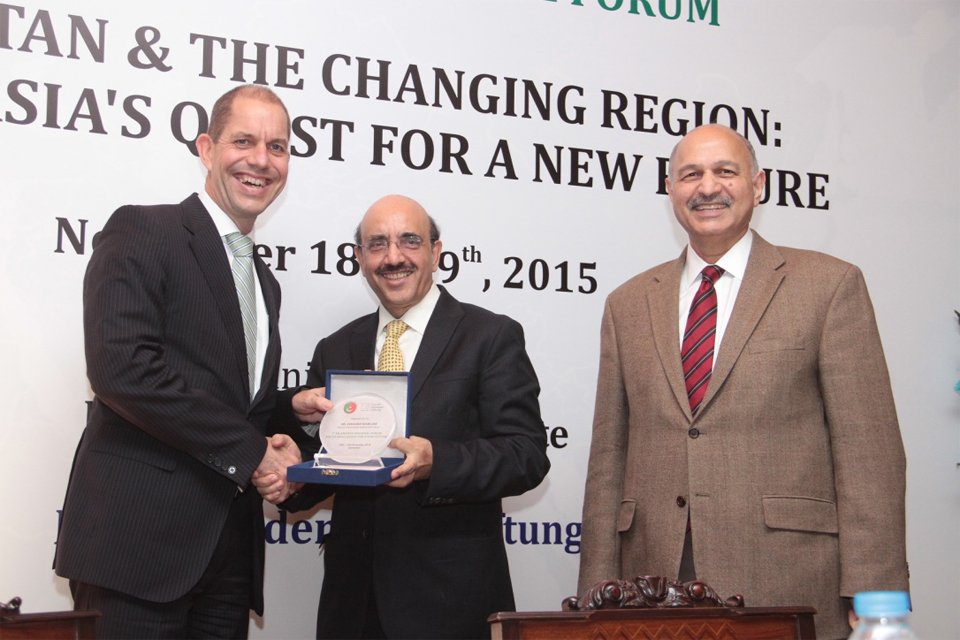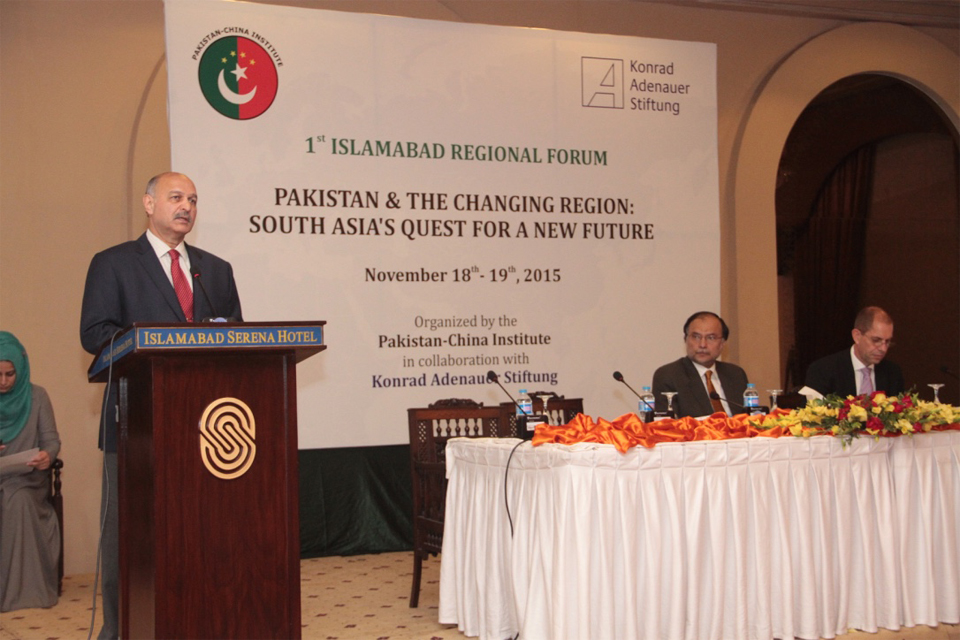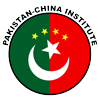PCI Launches the 1st Islamabad Regional Forum
Date : 24-11-2015
 |
The concept behind the Islamabad Regional Forum was drawn from Pakistan’s increasingly significant role in one of the most strategic and rapidly changing regions of the world – South Asia. With the Chinese expanding their role and influence in the region, Pakistan is at the heart of China’s most important policy initiative since the reforms of Deng Xiaoping in the 1980s – the concept of ‘One Belt, One Road’. The China-Pakistan Economic Corridor is associated with the Chinese dream of the New Silk Road and the Maritime Silk Road. Gwadar, the starting point of the corridor, will connect Pakistan to the landlocked Central Asian Republics through the Chinese province of Xinjiang.
With the $46 billion investment coming in to Pakistan, there is an ever increasing need for stability in the region if the benefits from this investment are to be reaped. Considering this, Pakistan is now reorienting its role to a more regional foreign policy. To this end, it successfully hosted the Afghan Peace Process after an outreach to the new Afghan Leadership, enhancing the country’s role as an honest broker. Pakistan has also made efforts to increase its outreach to Russia, and for the first time in history, Pakistan currently enjoys cordial relations with all three key players in the region, i.e. China, Russia and the Unites States.

With all these changes taking place, the Pakistan-China Institute, in collaboration with Konrad-Adenauer Stiftung, launched the Islamabad Regional Forum to deliberate on the rapid transformations taking place in Asia as a whole, and South Asia in particular. Speaking at the Inaugural session, Senator Mushahid Hussain, Chairman of the Parliamentary Committee on the China-Pakistan Economic Corridor and Chairman of the Pakistan-China Institute, remarked, “From the China-Pakistan Economic Corridor to the initiation of the Afghan Peace Process, Pakistan is playing a pivotal role, including the opening to Russia and the pipeline. We are trying to achieve increased regional cooperation and harmony that is driven by a sustainable economy”. Chief Guest Mr. Ahsan Iqbal, Federal Minister for Planning, Development & Reform, delivered a keynote address in which he stressed that the changing dynamics across the globe are posing numerous opportunities as well as challenges for academicians and policy makers. “We can see that the role of nation states is fast becoming irrelevant, as the countries where state structure is weak have become a major challenge for the country’s neighbors, as well as the entire world. We need to come up with proactive solutions to counter the forces of disruptive change and offer constructive change instead,” he reasoned.
While commending the efforts of Senator Mushahid Hussain and the Pakistan-China Institute in arranging such a forum, Dr. Gerhard Wahlers, Deputy Secretary General and Head of International & European Cooperation of Konrad Adenauer Stiftung, reiterated the importance of Pakistan in this region in relation to its key location and favorable demographics. He appreciated the efforts that are being undertaken to improve Pakistan’s security and economic situation. He strongly condemned terrorism across the globe and appreciated Pakistan’s role in the fight against this menace.

The first panel of the Forum, chaired by Ambassador Mohammad Sadiq, Secretary National Security and former Ambassador to Afghanistan, comprised of Professor Andrea Margelletti from Italy, Mr. Anil Shastri from India, and Senator Hasil Bizenjo from Pakistan, who discussed the emerging world order, and the changing dynamics of the Asian region in particular. Mr. Anil Shastri, son of former Indian Prime Minister Lal Bahadur Shastri, termed SAARC a failure, but vouched for closer cooperation between India and Pakistan. Andrea Margelletti, President of the Center for International Studies in Rome, gave a European perspective on the refugee crisis currently unfolding in Europe, while Senator Bizenjo, President National Party, discussed the impact of terrorism on Pakistan’s progress, and how the rivalry between India and Pakistan hampers the progress of the region as a whole. Former Senator, Mr. Afrasiab Khattak chaired the last session for the day, which was themed ‘South West Asia: Conflict or Cooperation?’ The featured panelists were Lt. Gen (R) Asad Durrani, former Head of Military Intelligence and the ISI, and former Ambassador to Germany and Saudi Arabia; Ambassador Khalid Mehmood, Chairman of the Institute of Strategic Studies Islamabad, and former Ambassador to China and Iran; and Dr. Zafar Nawaz Jaspal, Director of the School of Politics and International Relations at Quaid-e-Azam University, who enlightened the audience with their views on Pakistan and its relations with India, Afghanistan and Iran, as well as the implications the Afghan Peace Process and the Iran-nuclear deal would have on Pakistan and regional stability.
The Forum resumed on the second day with a panel on ‘Pakistan and China, The Changing Regional Scenario’, chaired by Ambassador Zafar Hilaly, former Ambassador to Yemen, Nigeria and Italy. Dr. Ejaz Akram, faculty member at the Lahore University of Management Sciences, shared valuable insights on China’s rise and its implications for the Muslim world. He stressed on the need for a new world consciousness, where civilizations work together to find solutions to prevalent problems. The session particularly focused on how the China-Pakistan Economic Corridor would benefit not only Pakistan, but the entire South Asia. In this regard, Professor Zhou Rong, eminent journalist and regional expert, detailed the benefits China and Pakistan would receive once the projects under the Economic Corridor materialize; while Ali Salman, founder of the Policy Research Institute of Market Economy delineated details of the projects and investments being undertaken in Pakistan with regards to the CPEC.
Ambassador Masood Khan, Director General of the Institute of Strategic Studies Islamabad, and former Ambassador to China as well as Pakistan’s former Permanent Representative to the UN, chaired the Closing Ceremony of the Islamabad Regional Forum. In his address, he highlighted the importance of achieving economic success in the country. He was of the view that once Pakistan achieves economic stability, geo-political stability will follow. Ambassador Masood outlined the connectivity the Chinese initiative of One Belt, One Road aims to provide for Asia and the region beyond, and stated that it would be incomplete without the Corridor being built through Pakistan. He referred to the China-Pakistan Economic Corridor as a ‘docking port’ and the ‘buckle on the belt’, a reference to the fact that CPEC connects the Silk Road Economic Belt and the Maritime Silk Road, thereby making it a key component of the Chinese initiative. He added, “Pakistan is destined to be a great nation; not only because of its geography but because of its human resources”. He reiterated the need for Pakistan to focus on improving its economy to guarantee a brighter future for its population. He also laid great emphasis on the importance of working together, and of holding such forums where academicians, policy makers, and the civil society come together to debate issues that are of key importance to them.
